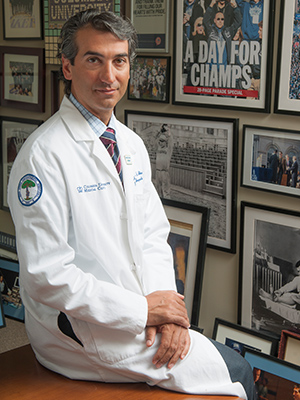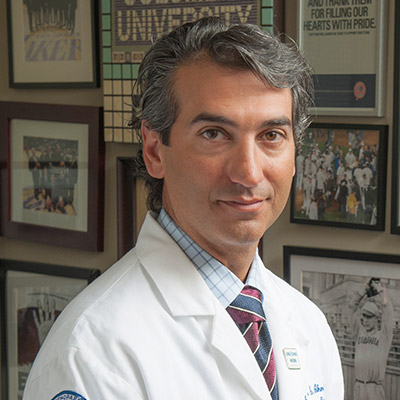Ulnar collateral ligament (UCL) reconstruction is recognized as an effective surgical approach to restore UCL function after injury, with the aim of enabling overhead-throwing athletes to return to their previous level of play. Recent studies have shown that return-to-play (RTP) rates after UCL reconstruction range from 33 percent to 92 percent. Factors that impact RTP include the surgical and graft fixation techniques employed, level of competition, and sport and position the athlete plays.
With the significant increase in the number of younger patients seeking UCL reconstruction (informally known as Tommy John surgery), it is especially important to understand all factors that can affect return to play after this procedure. Included in these are psychological factors that impact recovery of the injured athlete. Research has demonstrated that individual personality traits, fear of reinjury, and loss of interest all affect the ability to successfully return to play, and yet no comprehensive review has been performed on the topic to gauge its magnitude.

Dr. Christopher Ahmad
Christopher J. Ahmad, MD, Chief of Sports Medicine in the Department of Orthopedic Surgery at NewYork-Presbyterian/
“My life’s work and mission has been on how to improve Tommy John surgery, prevent Tommy John surgery, and study it in every capacity at every level of athletic performance,” says Dr. Ahmad, who is Head Team Physician for the New York Yankees and the New York Football Club and a member of the Advisory Committee of the Major League Baseball Team Physicians Association.
According to Dr. Ahmad, Tommy John surgeries are becoming widespread, if not routine, in the major leagues and indeed are on the rise. He is also concerned over the prevalence of UCL surgery among youth athletes, who are throwing with more velocity and more volume. “It is now obvious that youth athletes are at a disturbing risk for throwing-related injuries,” he says, noting that the 17- to 18-year-olds are needing UCL surgery the most. “In fact, major league baseball clubs are consistently drafting young players who have already had ulnar collateral ligament reconstruction.”
In their study, which was published in the October 7, 2022, issue of the Orthopaedic Journal of Sports Medicine, the NewYork-Presbyterian/
- Relates to clinical outcomes of UCL reconstruction
- Assessment of return to play
- Assessment of psychological factors
- Inclusion of more than 5 patients
The investigators performed a statistical analysis, noting the number and percentage of patients across each sport, competition level, and graft type. Likewise, they pooled and calculated the proportion of failures to return to play because of each psychological factor.
A total of 8 studies comprised of 378 patients were included in the final analysis:
- Mean patient age was 19.3 years (ranging from 13 to 35 years)
- Majority were baseball pitchers (327), followed by other baseball position players (35)
- 162 patients played at the college level; 143 at the high school level; and 20 at the professional level
- Most common graft types were palmaris longus (223) and gracilis (59) autografts
As this study determined that psychological factors underlie a large proportion of failures to return to play, surgeons should consider standardized preoperative and postoperative psychological screening in their patients undergoing UCL reconstruction.
— Dr. Christopher Ahmad and NewYork-Presbyterian Columbia study authors, Orthopaedic Journal of Sports Medicine
Findings included:
- Mean time to return to play was 12.2 months
- While the overall results were encouraging, there were failures
- For those patients considered failure, the most common reasons were clinical factors (24 patients, 46.2 percent), including elbow pain, other injury/medical condition, and reinjury
- Psychological factors comprised 40.4 percent of the reasons (21 patients) for failure to RTP
- Psychological factors affecting RTP included loss of interest (15 patients, 28.8 percent); fear of reinjury (3 patients, 5.8 percent); personal reasons (2 patients, 3.8 percent), and psychological concerns (1 patient, 1.9 percent)
Dr. Ahmad and the NewYork-Presbyterian/
In sports medicine, research of injuries overall has shown that fear of reinjury is a common reason for failure to RTP and is the main reason for failure in 20 percent to 50 percent of patients. The majority of these studies have investigated ACL reconstruction; limited research is available on how fear of reinjury affects athletes after UCL reconstruction. The mechanism of injury differs dramatically. ACL injuries typically involve an acute, traumatic onset of pain. UCL injuries are more often linked to nontraumatic repetitive exercise. Despite these differences, the authors believe that fear of reinjury is very pertinent to patients sustaining UCL tears as well.
Dr. Ahmad and the NewYork-Presbyterian/
- Surgeons consider standardized preoperative and postoperative psychological screening in their patients undergoing UCL reconstruction
- Use risk stratification to identify patients who might benefit from appropriate psychological interventions that may ultimately lead to improved outcomes after surgery
- Be attentive to the psychological considerations of their patients and empathize with their emotional concerns during their recovery from an injury




